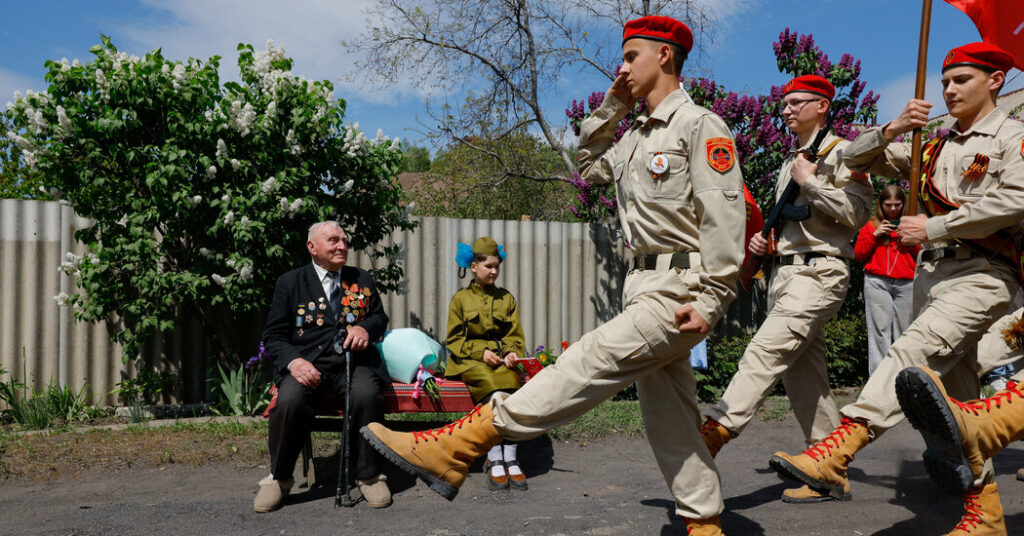The Russian soldiers who occupy Bakhmut in eastern Ukraine seemed excited about the 80th anniversary of Victory Day, the Russian holiday that marks the surrender of Nazi Germany in World War II.
The soldiers posted videos on social media, verified by The New York Times, of themselves hanging colorful posters and banners with messages in Russian like “Happy Victory Day.” One poster said “Immortal Regiment” and showed photos of veterans from the Soviet Union who fought in the war. Others proclaimed “Proud of Victory 1941-1945” and “80 years of the Great Victory.” One video showed the red flag of the Soviet Union with its hammer and sickle.
But almost no one lives in Bakhmut anymore. It’s a gray bombed-out ghost town, once home to about 70,000 people. In Bakhmut, and other cities in the Russian-occupied territories of eastern Ukraine, the holiday on Friday will be a muted affair, with small concerts and parades, sometimes against a background of rubble.
A senior Russian intelligence officer with the call sign Amur, from the 6th Motorized Rifle Division of the Southern Group, told the Tass news agency in mid-April that his division had ordered Victory Day posters for Bakhmut with the help of the region’s pro-Russian governor.
“This city had already been liberated,” he told Tass. “It is a Russian city.”
In Russia, Victory Day is rife with symbolism, especially this year when President Vladimir V. Putin is trying to show that his Russia is the heir-apparent of the Soviet Union in its heyday, and will soon defeat Ukraine.
Plans call for a giant military show in Moscow for more than two dozen world leaders.
By comparison, if social media is any guide, Victory Day celebrations in the occupied territories will be far more modest, though widespread. They will include the hanging of posters and paintings, and the occasional concert or quickie parade. Denis Pushilin, the Moscow-appointed leader in the Russia-held part of the Donetsk region — which includes Bakhmut — has said there would be more than 57,000 “memorial, celebratory and other events” over several months to celebrate the holiday.
But with these events, Mr. Putin seems to be trying to project to the world that these territories are already his.
The peace plan put forward by the United States in April would freeze the conflict near its current front lines. Under it, Bakhmut, such as it is, and many other cities might never again be part of Ukraine. Russia now occupies almost 20 percent of Ukraine.
In the run-up to Victory Day, Mr. Putin proposed a three-day cease-fire. Through the night on Wednesday, fighting and aerial bombardments continued along the front line but long-range missile and drone attacks deeper in Ukraine came to a halt, according to the Ukrainian military.
To celebrate Victory Day in the occupied town of Melitopol, southwest of Bakhmut, a new bell tower was consecrated in April at the Church of the Holy Great Martyr George the Victorious. A two-story tall poster was also hung on the side of a house, featuring the 80th anniversary’s logo and a soldier with a gun.
Oleksandr, who fled Melitopol but wanted to use only his first name because most of his family still lived there, said the images angered him.
“I’ve seen how my city is being distorted,” he said. “It’s just sad that the only thing they are proud of is winning a war 80 years ago. That’s all they have to show. And now they’re imposing this warped reality on those who still remain.”
The mayor of Sevastopol, in Crimea, seized by Russia in 2014, canceled a planned parade for Victory Day because of security reasons. Still, the city plans to hold a patriotic event and concert. The city also held a quick “personal parade” this week for two aged veterans. They were awarded jubilee medals.
The New York Times verified the location of the videos in Bakhmut from nearby buildings’ facades, windows and road layouts that matched satellite imagery and file images. The Times could not verify the date of the videos, but they were posted on Russian social-media channels in April.
At one point, in one video, a soldier walked around, showing off the posters. “We also have large billboards,” he said. “Bringing victory closer. Closer and closer. Of course, victory will be ours. There’s no doubt about it.”
He seemed not to be talking about a war from 80 years ago.
Russian troops captured Bakhmut after more than nine months of brutal fighting in May 2023. In the videos, it appears to be a broken husk of a city where a house with a window is an anomaly. Bent street signs and garbage litter the streets.
“This is horrifying — it’s like they’re dancing on bones,” said Olena Bukreieva, 60, a radiologist who once worked at the hospital in Bakhmut and watched the videos. “They’ve completely obliterated it. There isn’t a single building left intact. And now they’re painting flags and banners — it’s a mockery of the people, of everything. It’s unbearable to watch.”
Oleksandra Mykolyshyn contributed reporting from Kyiv, Ukraine; Yurii Shyvala from Lviv, Ukraine; and Jiawei Wang from Seoul.



